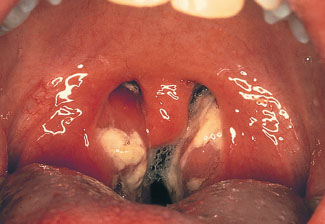* * *
infectious mononucleosis n an acute infectious disease associated with Epstein-Barr virus and characterized by fever, swelling of lymph nodes, and lymphocytosis called also glandular fever, kissing disease, mono
* * *
* * *
a common, acute, usually self-limited infectious disease caused by the Epstein-Barr virus, characterized by fever, membranous pharyngitis, lymph node and splenic enlargement, lymphocyte proliferation, and atypical lymphocytes; it gives rise to various immune reactions, such as development of transient heterophile antibodies and persistent Epstein-Barr virus antibodies. Potential complications include hepatitis and encephalomeningitis. It affects primarily adolescents and young adults, being spread by saliva transfer and possibly other modes; in children the infection is largely subclinical. Called also glandular fever and kissing disease.
 Severe pharyngotonsillitis, with uvular erythema and edema, in infectious mononucleosis.
Severe pharyngotonsillitis, with uvular erythema and edema, in infectious mononucleosis.
Medical dictionary. 2011.